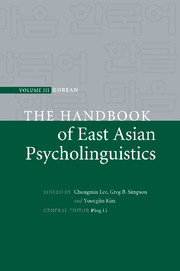Book contents
- Frontmatter
- Contents
- List of figures
- List of tables
- List of contributors
- Preface
- Introduction: Advances in Korean psycholinguistics
- Part I Language acquisition
- 1 Acquisition of the subject and topic nominals and markers in the spontaneous speech of young children in Korean
- 2 The acquisition of argument structure and transitivity in Korean: a discourse-functional approach
- 3 Acquisition of case markers and grammatical functions
- 4 Do Korean children acquire verbs earlier than nouns?
- 5 The acquisition of the placement of the verb in the clause structure of Korean
- 6 Learning locative verb syntax: a crosslinguistic experimental study
- 7 Language-specific spatial semantics and cognition: developmental patterns in English and Korean
- 8 Acquisition of negation in Korean
- 9 The acquisition of Korean numeral classifiers
- 10 Acquisition of Korean reflexive anaphora
- 11 The Korean relative clause: issues of processing and acquisition
- 12 The accessibility hierarchy in Korean: head-external and head-internal relative clauses
- 13 Development of functional categories in child Korean
- 14 The acquisition of modality
- 15 The syntax of overmarking and kes in child Korean
- 16 Events in passive development
- 17 Universal quantification in child grammar
- 18 Acquisition of prosody in Korean
- 19 Korean as a heritage language
- 20 Maturational effects on L2 acquisition
- 21 L2 acquisition of English articles by Korean speakers
- 22 The acquisition of wanna contraction by adult Korean learners of English
- 23 Phonological abilities of Korean–English bilinguals
- 24 Parameters on languages in contact: an altered view of codeswitching
- 25 Influence of socio-psychological categories in bilingual interaction
- 26 Ontological concept versus shape in word learning from a crosslinguistic point of view
- 27 Notes on Korean Sign Language
- Part II Language processing
- References
- Name index
- Subject index
4 - Do Korean children acquire verbs earlier than nouns?
from Part I - Language acquisition
Published online by Cambridge University Press: 05 June 2012
- Frontmatter
- Contents
- List of figures
- List of tables
- List of contributors
- Preface
- Introduction: Advances in Korean psycholinguistics
- Part I Language acquisition
- 1 Acquisition of the subject and topic nominals and markers in the spontaneous speech of young children in Korean
- 2 The acquisition of argument structure and transitivity in Korean: a discourse-functional approach
- 3 Acquisition of case markers and grammatical functions
- 4 Do Korean children acquire verbs earlier than nouns?
- 5 The acquisition of the placement of the verb in the clause structure of Korean
- 6 Learning locative verb syntax: a crosslinguistic experimental study
- 7 Language-specific spatial semantics and cognition: developmental patterns in English and Korean
- 8 Acquisition of negation in Korean
- 9 The acquisition of Korean numeral classifiers
- 10 Acquisition of Korean reflexive anaphora
- 11 The Korean relative clause: issues of processing and acquisition
- 12 The accessibility hierarchy in Korean: head-external and head-internal relative clauses
- 13 Development of functional categories in child Korean
- 14 The acquisition of modality
- 15 The syntax of overmarking and kes in child Korean
- 16 Events in passive development
- 17 Universal quantification in child grammar
- 18 Acquisition of prosody in Korean
- 19 Korean as a heritage language
- 20 Maturational effects on L2 acquisition
- 21 L2 acquisition of English articles by Korean speakers
- 22 The acquisition of wanna contraction by adult Korean learners of English
- 23 Phonological abilities of Korean–English bilinguals
- 24 Parameters on languages in contact: an altered view of codeswitching
- 25 Influence of socio-psychological categories in bilingual interaction
- 26 Ontological concept versus shape in word learning from a crosslinguistic point of view
- 27 Notes on Korean Sign Language
- Part II Language processing
- References
- Name index
- Subject index
Summary
Introduction
How do children learn the early words? Do linguistic differences influence early lexical development? The Korean language has been the focus of particular interest in answering this question. Unlike English, Korean is a SOV language in which verbs are more likely to occur in the perceptually salient final position of an utterance. In addition, Korean allows for nominal ellipsis, so that the subject of a sentence can be left out. As a result, verbs are perceptually and structurally more salient in Korean language input to children. Do these differences in Korean input make a difference in the pattern of noun and verb acquisition of Korean children?
Noun bias
Theoretical claims for the noun bias
Gentner (1982) has claimed that the semantic structures underlying verbs and other predicates are more complex and open-ended than those of nouns. According to Gentner, nouns are learned before verbs because their semantic structures are less complex than those of verbs. Moreover, children have a conceptual predisposition early on to treat words as mapping onto objects. More recently, the constraints view has also endorsed the noun bias claim. According to Markman (1989), children assume that a novel word applied to an object is likely to refer to the whole object, rather than its parts, its substance, or to its actions and changes of states (the “whole object constraint”). Therefore, the whole object constraint would favor the noun bias in early lexical development. Another constraint also favors the noun bias.
- Type
- Chapter
- Information
- The Handbook of East Asian Psycholinguistics , pp. 63 - 71Publisher: Cambridge University PressPrint publication year: 2009



